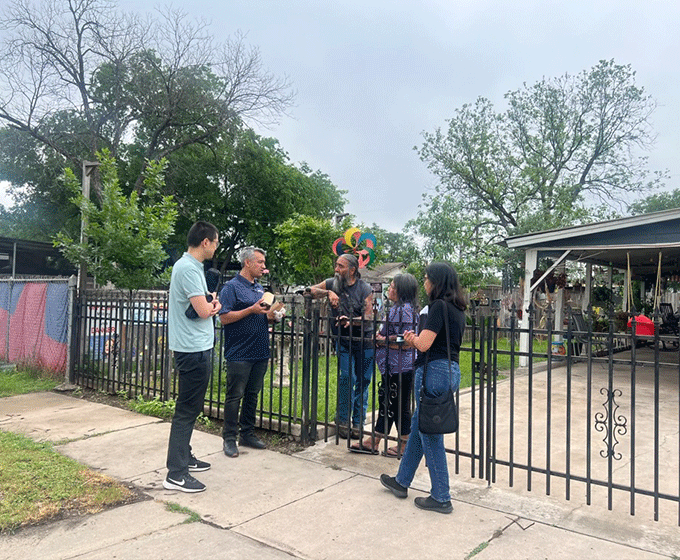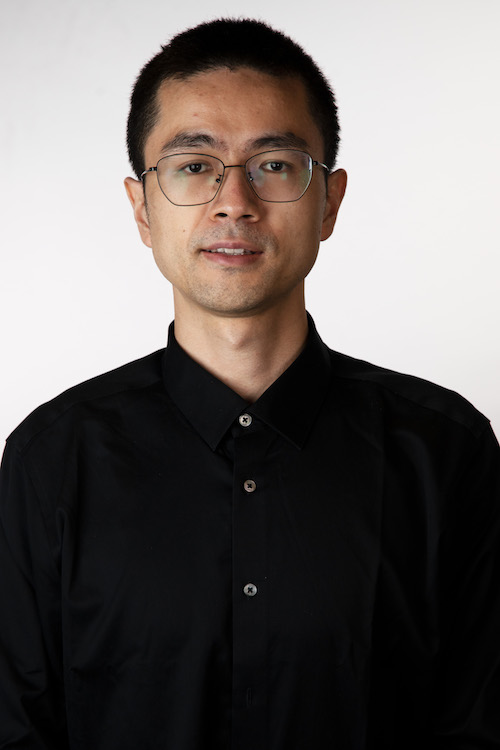
Esteban López Ochoa and Wei Zhai collecting data together with community members.
SEPTEMBER 23, 2024 — Two UTSA researchers will participate in a collaborative project to advance research and education in urban digital twins (UDTs) and responsible artificial intelligence (AI). The project aims to improve the resilience of communities, especially those of color, by leveraging these technologies to address the urban challenges they face.
UTSA faculty members Wei Zhai and Esteban López Ochoa in the UTSA School of Architecture and Planning and the university’s Center for Urban and Regional Planning Research will collaborate with Xishuang Dong, an assistant professor of electrical and computer engineering at Prairie View A&M University and the project’s principal investigator. Additionally, Xinyue Ye, urban planning professor and director of The Center for Geospatial Sciences, Applications, and Technology at Texas A&M University, will contribute to the project, which will offer UTSA students a unique hands-on learning experience.
Community resilience refers to how well a community is equipped to persist during adverse events, such as natural disasters, economic downturns and public health crises, and to how quickly the community recovers once the situation stabilizes.
“As urbanization accelerates, urban communities — particularly those predominantly comprised of racial and ethnic minorities — face unique and complex challenges, weakening the resilience of the community," Zhai said. “These include increased poverty rates, displacement, relocation, limited access to quality education, disparities in healthcare access, and substandard housing conditions.”
The project aims to alleviate these challenges by using responsible, foundational AI models and tools to create urban digital twins.
A digital twin is a virtual model of an object or system that uses real-time data to simulate, monitor or predict behavior. Digital twins can operate with ongoing, two-way data, making them the most precise way to represent a city and its actual systems.
 Wei Zhai
Wei ZhaiThe project leads hope to create an urban digital twin that will simulate an urban community and analyze its resilience and weak points.
“A digital twin of a city offers planners and citizens a powerful tool for understanding how changes in planning and infrastructure can impact a community’s resilience to natural hazards,” Zhai said. “By digitally modeling and testing various resilience scenarios, planners, policymakers and citizens can identify the most effective, science-based strategies for hazard resiliency interventions. The platform will gather vast amounts of data, including information on people, vehicles, structures and infrastructure, enabling the simulation of hazard events under different policy or response scenarios to assess their potential impacts.”
Zhai added that the project’s ultimate goal is to develop innovative solutions to address urban challenges.
“Digital twins can provide the insights needed to inform resilient decision-making in vulnerable communities,” he said. "We’re examining the LiDAR sensor and low-cost environmental sensor technologies, artificial intelligence, mechanisms and policies needed to increase community resilience.”
 Esteban López Ochoa
Esteban López OchoaThe team will use the data collected with these tools for 3D modeling of cities and micro-climate simulations.
Modeling multiple facets of a community accurately and in real time can be challenging, as communities involve multiple interconnected elements. Those elements include the people, infrastructure and environments, which influence one another in a complex feedback loop.
“During a severe storm, for example, predicting human behavior is difficult,” Zhai said. “Some residents may follow evacuation orders, while others might stay behind to protect their homes, even though it's risky. This unpredictability complicates resource allocation. It’s hard to determine the number of emergency shelters needed or how many rescue personnel are dispatched. Additionally, panic or misinformation could lead to unexpected traffic jams or crowding in specific areas, further complicating emergency response efforts. Incorporating these unpredictable human behaviors into a real-time model adds significant complexity.”
The team hopes that a digital twin powered with AI will be able to cut through these layers of uncertainty, providing valuable insights that help policy makers anticipate needs and plan for challenges.
“This project can help to better visualize and predict long-term resilience risks such as population growth, housing and transportation demand, and all the various urban issues that can come from such core changes,” López Ochoa said. “For example, understanding how, when and why people move to a new home within the city can help both explain and address issues such as job absenteeism, delays, lack of labor supply, food deserts and even housing affordability.”
In the process, the team also hopes to integrate AI into new research projects and academic programs at UTSA, engage students in leading-edge research and cultivate a workforce with in-demand skills such as AI, urban planning and data science.
“We are excited to offer UTSA students funded opportunities to work on urban research that is at the knowledge frontier,” López Ochoa said.
The team plans to study San Antonio and Houston initially then expand the digital twin modeling to other cities across Texas in subsequent phases. The project began in September 2024 and will continue until August 2027.
The National Science Foundation (NSF) awarded the project $1 million, which includes a subaward of $293,000 to the UTSA team.
UTSA Today is produced by University Communications and Marketing, the official news source of The University of Texas at San Antonio. Send your feedback to news@utsa.edu. Keep up-to-date on UTSA news by visiting UTSA Today. Connect with UTSA online at Facebook, Twitter, Youtube and Instagram.
Late Night at the Rec is an awesome UTSA tradition that turns a typical information session into an exciting night of fun. It's a unique opportunity to meet new people and reconnect with old friends.
Campus RecreationCheer on the UTSA Soccer team as they take on Lamar in the first home game of the season.
Park West FieldShow your UTSA pride with our spirited crew—Rowdy, Cheer, the Spirits of the Roadrunner, and the incredible Spirit of San Antonio Marching Band (SOSA)—as we light up the night in true Roadrunner style.
Main Campus East Lawn, Main CampusAnnual Giving will host a First Day of School celebration to welcome students back to campus. We will have giveaways and photo opportunities.
Sombrilla Plaza, Main CampusEnjoy snacks while connecting with Adobe reps and student ambassadors. Download or log into the Adobe Express app to snag swag and unlock exclusive back-to-school templates. It’s a fun, fast way to get creative and start the school year with bold moves.
Central Plaza, Main CampusCelebrate the merger of UTSA and UT Health San Antonio with a pop-up featuring free t-shirts, exclusive swag, and interactive photo opportunities. Open to all students, faculty and staff. Supplies are limited!
Sombrilla Plaza, Main CampusHuddle Against Hunger is a fundraising competition with Texas State that benefits our Roadrunner Pantry. Donations this week will help UTSA earn additional prize monies provided by RBFCU.
In-Person and VirtualThe University of Texas at San Antonio is dedicated to the advancement of knowledge through research and discovery, teaching and learning, community engagement and public service. As an institution of access and excellence, UTSA embraces multicultural traditions and serves as a center for intellectual and creative resources as well as a catalyst for socioeconomic development and the commercialization of intellectual property - for Texas, the nation and the world.
To be a premier public research university, providing access to educational excellence and preparing citizen leaders for the global environment.
We encourage an environment of dialogue and discovery, where integrity, excellence, respect, collaboration and innovation are fostered.